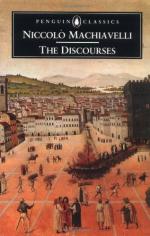
|
| Name: _________________________ | Period: ___________________ |
This quiz consists of 5 multiple choice and 5 short answer questions through Book One, The Development of Rome's Constitution, The Use and Abuse of Dictatorship, The Road to Ruin, Sundry Reflections Based on the Decemvirate.
Multiple Choice Questions
1. According to Machiavelli, what type of people seek what office to cause a city to become corrupt?
(a) Generals seek to become senators.
(b) The rich and powerful, rather than the virtuous, seek to become judges (magistrates).
(c) Weak and dependent people seek to become senators.
(d) The working poor seek to become plebes.
2. How does Machiavelli suggest that Princes and other leaders deal with acts that offend their citizens?
(a) Make the offense quickly then act to reassure them and give them cause to quiet and firm their spirits.
(b) Distract the Citizens by making war against a nearby province.
(c) Increase taxes on the wealthy and use the money in ways that benefit the general masses.
(d) Increase their power and penalties for crimes and scare the Citizens into submission and acceptance.
3. What does Machiavelli suggest causes corruption?
(a) An insufficiency of or inability to enforce laws that deal effectively with corruption.
(b) Princes who are not cruel enough with punishment.
(c) Rebellious citizens who defy ruling authorities.
(d) Princes who are preoccupied with seeking pleasure rather than power.
4. What should the reader consider as evil when Machiavelli is advising Princes to "recognize evils".
(a) Evil is those human inclinations that cause them to act selfishly.
(b) Evil is those public reactions that oppose the Prince.
(c) Evil is anything with which a Prince does not agree.
(d) Evil should be considered to be any influence which challenges the power of the Prince.
5. What does Machiavelli believe to the nature of men that causes them to either fight from ambition or from necessity?
(a) They are able to desire everything but are not able to attain everything.
(b) Men that choose to fight always fight for personal benefit.
(c) They fight so they can have the power to deliver liberty to themselves and the City.
(d) Men that choose to fight always fight for the glory of the City.
Short Answer Questions
1. What are the two important items that Machiavelli considers to be unwise for a Prince to put entirely into peril?
2. What does Machiavelli claim causes ingratitude from a conquered citizenry?
3. What can be inferred of Machiavelli's view of freedom based upon reading view of weak and strong Princes?
4. Why does Machiavelli recommend that those who want to reform a city should retain the appearance of the institutions they want to reform?
5. Who were the Decemvirs?
|
This section contains 603 words (approx. 3 pages at 300 words per page) |

|




